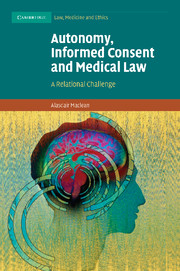Book contents
- Frontmatter
- Contents
- Table of cases
- List of figures
- Acknowledgements
- Introduction
- Part I An ethical model
- 1 Autonomy
- 2 The relevance of beneficence, justice and virtue
- 3 The healthcare professional–patient relationship: Setting the context for consent
- 4 The concept of consent: What it is and what it isn't
- Part II Consent and the law
- Summary and conclusion
- Bibliography
- Index
4 - The concept of consent: What it is and what it isn't
Published online by Cambridge University Press: 02 July 2009
- Frontmatter
- Contents
- Table of cases
- List of figures
- Acknowledgements
- Introduction
- Part I An ethical model
- 1 Autonomy
- 2 The relevance of beneficence, justice and virtue
- 3 The healthcare professional–patient relationship: Setting the context for consent
- 4 The concept of consent: What it is and what it isn't
- Part II Consent and the law
- Summary and conclusion
- Bibliography
- Index
Summary
In the first three chapters I discussed the ethical basis and practical context of consent to medical treatment. I argued that the primary justification for consent is the patient's agency expressed through his or her autonomy but that the context of the professional–patient relationship constrains the implications of that autonomy. On entering the relationship both the professional and the patient acquire certain obligations towards the other party that shape how the patient's autonomy is given effect. In this chapter I will explore the concept of consent itself bearing in mind the arguments and conclusions of the earlier chapters.
For my purposes there are four reasons why it is essential to explore the concept in some depth. First, without an insight into consent any attempt to determine the regulation of consent will be flawed. Second, arguments advanced about consent may in fact be about a primary underlying claim right rather than about consent per se. This type of argument will remain hidden and inadequately dealt with unless it is exposed and to do this requires recognition of both the meaning and extent of consent. Third, an understanding of consent and its requirements is necessary to predict the interaction between consent and the provision of healthcare. Fourth, elucidation of consent will then allow a critique of the current law.
In the discussion that follows I approach consent from first principles to construct a model that reflects the roles of both parties to the healthcare professional–patient relationship.
- Type
- Chapter
- Information
- Autonomy, Informed Consent and Medical LawA Relational Challenge, pp. 110 - 146Publisher: Cambridge University PressPrint publication year: 2009

